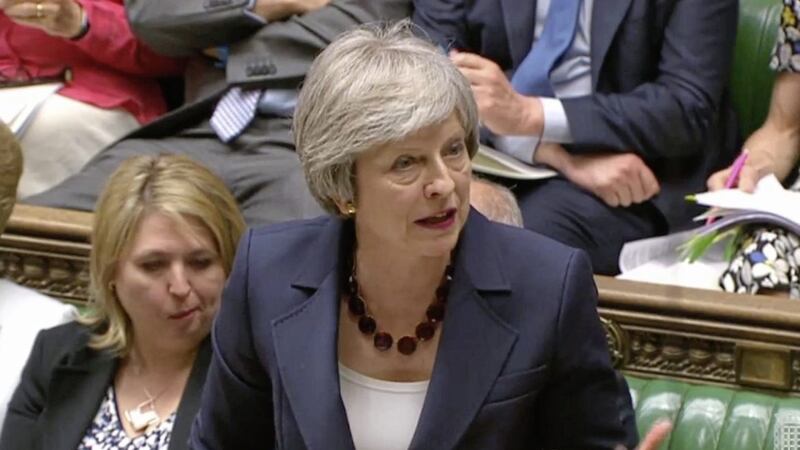NATIONALISTS have reacted angrily to Theresa May's claim that the process for probing Troubles-related killings is "patently unfair" to soldiers and police.
In a statement to fellow MPs that appears completely at odds with official figures, the Tory leader claimed that "the only people being investigated" are those who served in armed forces or law enforcement.
Her comments during prime minister's questions at Westminster follow concern among senior Conservatives over prosecutions of British soldiers for offences during the conflict.
Reports emerged of a "spat" in the cabinet where ministers raised concerns over plans to introduce a new Historical Investigations Unit (HIU), as agreed in the legacy component of 2014's Stormont House agreement.
According to the BBC, Defence Secretary Gavin Williamson was among ministers worried that military veterans may not have enough protections.
Some MPs have called for a statute of limitations which would prevent former soldiers facing trial for Troubles-related offences.
But the measure was absent from a Northern Ireland Office consultation on legacy legislation that was circulated to Stormont parties earlier this week.
Nationalists object to such a move on the basis that it would effectively signal an amnesty for members of the armed forces, while some unionists oppose it because the legal precedent could also enable paramilitaries to escape prosecution.
DUP MP Sir Jeffrey Donaldson called for a statute of limitations "not just focused on Northern Ireland" but also covering conflicts such as Iraq and Afghanistan.
"A statute of limitations is a much broader issue – we believe it should be dealt with separately from the legacy proposals," Sir Jeffrey said.
"If you introduce a statute of limitations which relates only to Northern Ireland and our troubled past, organisations like the IRA would then press for an amnesty for their members and we believe it would be completely unacceptable to equate members of the armed forces with members of an illegal terrorist organisation."
Mrs May told MPs yesterday that there was an "unfair situation at the moment".
"The situation we have at the moment is that the only people being investigated for these issues that happened in the past are those in our armed forces or those who served in law enforcement in Northern Ireland - that is patently unfair," she said.
"Terrorists are not being investigated, terrorists should be investigated and that is what the government wants to see."
Speaking earlier, Secretary of State Karen Bradley also said the status quo was "not good enough".
"The only people today who are getting knocks on the door from the police telling them that they face inquests are the military, we need to change that and that's why we need to issue a consultation."
But nationalists reacted angrily to the comments.
Sinn Féin deputy leader Michelle O’Neill said victims were being "held to ransom by Tory in-fighting".
"Victims are frustrated and angry at the constant delays and prevarication from the British government – this is being compounded by the ongoing refusal to release the legacy inquest funding requested by the lord chief justice," she said.
Ms O'Neill called on the secretary of state to bring forward the legacy consultation and a timeframe for implementing the mechanisms of the Stormont House agreement.
SDLP justice spokeswoman Dolores Kelly said Theresa May was "politically hamstrung".
"The British prime minister has completely misled the House of Commons today with her remarks – it is an absolute scandal for Theresa May to claim that the only people being investigated in relation to the Troubles are law enforcement agencies and the armed forces," the Upper Bann MLA said.
She claimed the Tory leader's comments highlighted the "choke hold" that the DUP has on Theresa May and her government.
However, Ulster Unionist justice spokesman Doug Beattie said the proposed HIU was "at best a grave miscalculation by the UK government, and at worse a betrayal of the RUC and the army".
::::::::::::::::::::
OFFICIAL figures from the PSNI contradict claims about a lopsided approach to legacy investigations.
The prime minister is not the only one to have made the claim – former Secretary of State James Brokenshire, other senior Conservatives, the DUP, and other unionists have all alleged an imbalance in probing Troubles killings.
Last year, the then Director of Public Prosecutions Barra McGrory took the unusual step of publicly defending the independence of his office after criticism from MPs.
PSNI figures have previously shown that investigations into killings by the British army accounted for around 30 per cent of its legacy workload.
Of 1,118 cases not previously reviewed or completed by the now defunct Historical Enquiries Team (HET), 530 involved republicans, 271 were by loyalists and 354 by the security forces. The remaining 33 deaths are unattributable.
The HET completed reviews of 1,625 cases relating to 2,051 deaths.
Of those, 1,038 were attributed to republican paramilitaries, mostly the Provisional IRA, while 536 cases were attributed to loyalists and 32 to the British army.
Mr McGrory also stated last year that his office has prosecuted more legacy cases linked to paramilitaries than the military.








